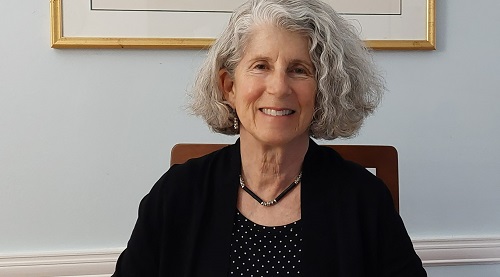
Meet Our New Volunteer Transformation Partnerships Writer
Meet Ellen Weiss – our new volunteer who will be writing articles and providing additional learning materials focused on our Transformation Partnerships. She has more than 30 years of international experience in research, programming, and communications, with a particular emphasis on gender equality. This includes working with the International Center for Research on Women (ICRW), one of Rise’s Transformation Partners. Ellen is a member of Rise’s DC, Washington-4 chapter.
How did you get interested in international development?
In 1983, I went on an Oxfam study tour of Sri Lanka to learn about a social development movement called Sarvodya. Ten days into the visit, civil war broke out, and a national curfew was instituted. After it was lifted, and we could resume our activities, the tour leader gave an update from the State Department. There was a special message for me: “Ellen, your mother says come home.” I didn’t. In fact, I stayed an extra week. The experience opened my eyes to the power of community organizations to effect change and the devastation wrought by conflict. The following year I went on a study tour of Nicaragua’s health care system and eventually got a job teaching nutrition at the university. It was during the period of the U.S.-backed contra war. My mother was not happy. Nevertheless, I stayed 2 years.
How did your work pivot to a focus on gender equality?
After I got my Masters, I began working on HIV. It was the early 90s and the epidemic was raging. I applied for a job at ICRW to co-lead a research program on women and AIDS. At the time, I was coordinating HIV prevention efforts in Latin America for a U.S.-based NGO. Our projects focused on sex workers and men who had sex with men. During my interview at ICRW, they asked me how women other than sex workers might be vulnerable to HIV. I went blank. Women, who were they? Nothing was coming into my brain. I finally said some gibberish, but by then the interviewers had tuned out. Imagine my surprise when ICRW offered me the job. On my first day of work, I asked my colleague, “Why did you hire me?” She said, “because you knew AIDS and I knew women. I thought we would make a good pair.” I learned so much from her and from our research program about how gender inequality plays out not just around HIV, but in the social, economic, and political spheres of women’s lives.
In your career, you have traveled to many countries. What have been some highlights?
In 1995, I attended the Fourth World Conference on Women in Beijing. That was where Hillary Clinton said, “Women’s rights are human rights.” But who also impressed me was a woman named Ela Bhatt, an organizer and activist who led the Self-Employed Women’s Association (SEWA) of India. She was on a panel entitled, “Does microfinance reduce poverty?” The person who spoke first was Muhammad Yunus who founded the Grameen Bank, a pioneering organization in giving people small loans to start businesses. He described how microfinance works and concluded that it does reduce poverty. Then Ela Bhatt spoke, a diminutive woman with a booming voice. “Does microfinance reduce poverty?” she asked. “No,” she answered. “Women do.”
How and why did you first get involved with Together Women Rise?
I started attending meetings back in the Dining for Women days. I remember being impressed with the model – one that engages women in the U.S. to learn more the lives of women and girls globally and creates opportunities to take action to empower them.
What excites you about working with Transformation Partnerships?
The organizations that Rise is funding have been addressing gender inequality for a long time. They understand that to effect lasting change you need to address the social, economic and political systems that affect women and girls’ lives. This means working with a host of actors, including men and boys, community leaders, policymakers, and public and private institutions. Based on my own experience, this pivot by Rise is a vital complement to its project-focused work. We need both to make a difference. I’m also excited because Rise’s allocation of unrestricted grants shows that they are on the cutting edge of philanthropy. A friend is spearheading a movement to encourage grantors to provide flexible funding to enable organizations to become stronger, and more sustainable and strategic. Bravo to Rise’s vision of grant making!
Watch for future articles by Ellen in our newsletter, The Dish, and via your email.
Click here for more information on Together Women Rise’s Transformation Partnerships.
